WHEN THE FIRST CLASS of male students arrived on the Regis campus in 2007, the sun was shining; the air was filled with excitement and hopes for a bright future. There were, of course, first-day jitters—not just for the men but for a campus community going through one of the most major transitions in its 80-year history.
Staff members, donned in Regis polo shirts, were on hand to welcome students for the Labor Day weekend move-in day. The young men, a total of 60, formed an almost immediate bond. They were naturally grouped as “the first male class,” charged as trailblazers. But each came to Regis with very individual personalities, individual experiences, and individual goals.
“I remember the day the male students attended classes for the first time and the excitement that was all around us,” recalls Regis President Antoinette M. Hays, PhD, RN (at the time dean of nursing). “It was gratifying to see men empowered in an environment that has always empowered women.”
A top priority during the transition was to include faculty, staff, alumnae, and the student body, according to Kara Kolomitz, EdD, vice president of student affairs and enrollment (at the time dean of students). She recalls the evening the Board of Trustees voted to go coed. “I walked over to the cafeteria and went table to table and told the women the news. They appreciated being included in the process and were intrigued about the future of our campus.”
A second priority, Kolomitz adds, was to ensure that facilities were welcoming and inclusive for men. The athletic program added multiple sports and new fields. Faculty transformed classrooms.
Success came in the form of vibrancy and a unified community.
“There was an added dimension for faculty and staff to serve a larger, more diverse student population and everyone influenced and supported the transition in their own unique way,” Kolomitz explains. “But all the credit for the transition goes to the student body: the women who graciously and enthusiastically welcomed the first and future classes of men, and the men who saw the opportunities Regis held.”
Ten years later, it is time to reflect on the university’s mission: Regis empowers women and men of all backgrounds to excel academically, to become compassionate and informed leaders, and to be a force for good in the world.
Four male alumni share personal stories of their Regis experience and where it has led them since graduation.
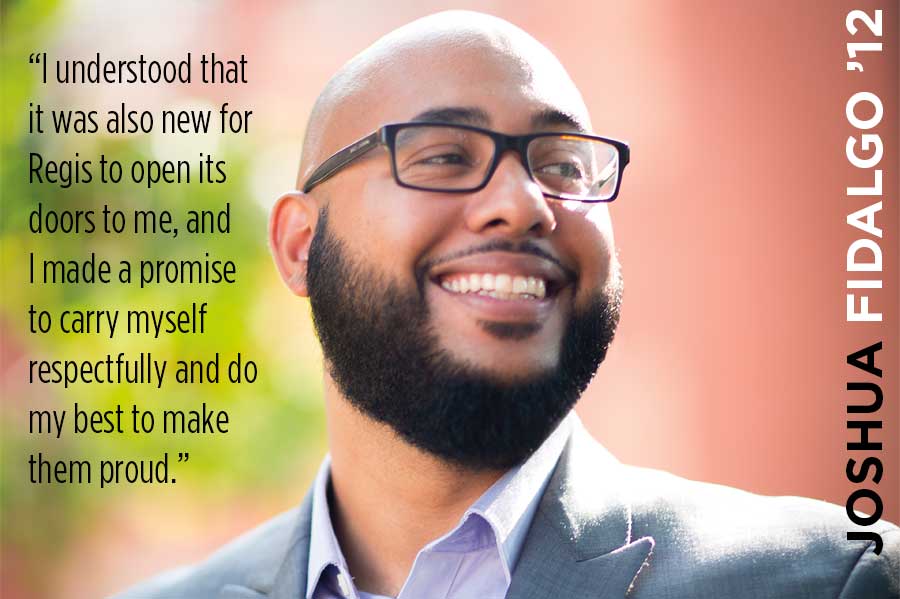
Joshua Fidalgo '12
"I understood that it was also new for Regis to open its doors to me, and I made a promise to carry myself respectfully and do my best to make them proud."
J
oshua Fidalgo ’12 is always up for a challenge. So when he came to Regis just one year after the university went coed, he saw an opportunity to prove that the school had made the right decision to accept men.
“Going to Regis was a drastic shift for me because I attended all-boys middle and high schools,” he recalls. “But I understood that it was also new for Regis to open its doors to me, and I made a promise to carry myself respectfully and do my best to make them proud.”
Part of that came from participating in athletics. An experienced striker from Boston College High School’s Division I soccer team, Fidalgo became a key player on the first men’s soccer team at Regis. And he did not let the team’s somewhat rocky start stop him.
“The first couple of years were hard because the team was such a mix of experience levels,” Fidalgo says. “I knew that it wouldn’t be easy but I wanted to be part of developing the program. It was a matter of knowing that even though we weren’t going to win every game, we had to continue to work together and do our best.”
But things changed. “By senior year, we were close to making the playoffs; we were creating a name for the Regis soccer team.”
Fidalgo and his teammates created a special bond. “At the end of the day it was all about supporting one another. We ate together, studied together, and lived on the same floor. Just knowing that we had folks willing to jump into battle with us helped provide a comfort level because there were so few men on campus at the time.”
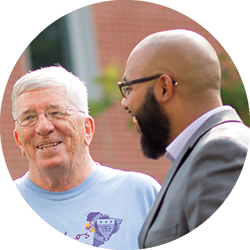
Fidalgo arrived at Regis with many values in place. As a young boy growing up in the Boston communities of Roxbury and Dorchester, he was very involved in his local parish and attended Jesuit middle and high schools. A commitment to service was something he knew he would continue in college, but he had yet to learn how much those values would continue to develop.
Enter Father Paul Kilroy—Catholic chaplain and minister at Regis (pictured above with Fidalgo). “Father Paul pushed the value of perseverance,” Fidalgo explains. “Even when I felt like I was at my capacity in regard to activities, Father Paul would say, ‘Alright Josh, here’s another one.’”
Fidalgo was busy: In addition to soccer, he held the first men’s single win for tennis; he was a resident assistant and an orientation leader; he served in Campus Ministry (now known as the Center for Ministry and Service). And, Father Paul suggested, how about a service trip to Peru? Then, an Erat Scholarship to Israel.
“It was incredible to walk the same path that Jesus did,” Fidalgo says of the experience. Among the highlights: placing a prayer in Jerusalem’s Wailing Wall (also known as the Western Wall), a place of biblical sacrifice and prayer; swimming in the Dead Sea and boating down Sea of Galilee; seeing a fellow student baptized in the Jordan River.
“If not for Regis, I would not have had these kinds of opportunities,” Fidalgo says.
Throughout his many experiences, Fidalgo practiced accountability. “Your actions are what people will remember about you, and it is important to do well by others.”
Today, as dean of student life at Dearborn STEM Academy in Dorchester, Massachusetts, Fidalgo shares the skills he gained at Regis with his students—many of whom have experienced trauma. He first worked at the school as a City Year corps member before joining the staff and working his way up through the ranks.
As STEM mentoring director, he successfully launched the school’s V.I.S.I.O.N. mentoring program to broaden students’ social-emotional awareness through mentorship with community partners. He did not promise “an easy life” for students; rather, he taught them to seek out individuals like Father Paul. “Find people who are going to be in your corner, be real with you, and let you know what’s out there.”
When the school transitioned from a middle school to a grade 6–12 STEM academy in 2015, Fidalgo moved to his current operational role. He aims to maintain the school’s culture and climate to ensure students know that through the transition “we are going to be okay and push forward.”
How does Fidalgo know that? “I take from my experiences during Regis’ transition to a coed campus,” he says. “I knew that it would be both challenging and exciting going through a lot of ‘firsts,’ but my perseverance and support from others taught me that anything is possible.”
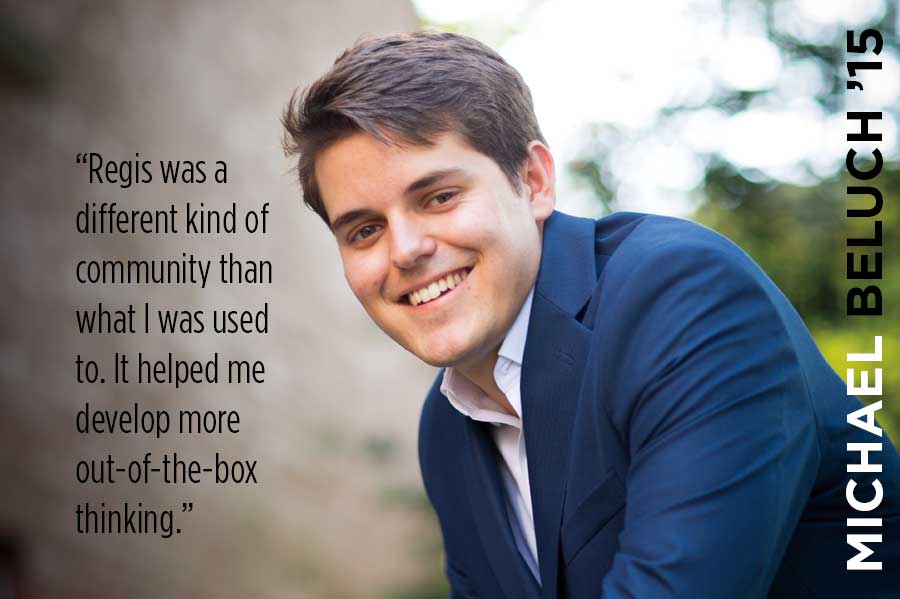
Michael Beluch '15
"Regis was a different kind of community than what I was used to. It helped me develop more out-of-the-box thinking."
M
ichael Beluch ’15 was “very quiet” in high school, but he promised himself he would be different at Regis. His voice, he quickly realized, would have more breadth and depth as he collaborated with female peers.
“Coming from an all-boys high school, Regis was a different kind of community than what I was used to,” Beluch explains of the demographic shift toward a coed campus. “It helped me develop more out-of-the-box thinking than my typical systematic solutions.”
Because of the small classes at Regis, Beluch did find himself talking more—becoming a people person. He started discussions with professors and classmates. He had an open door policy in his dorm room. And it didn’t take long for Beluch to recognize that his growth of perspective went beyond gender differences. It came from cultural and ethnic diversity on campus, a mixture of personalities, and, simply, everyday experiences.
“Regis was presenting me with opportunities to gain skills and meet people that otherwise I may not have met,” Beluch says. “I could either choose to step up or choose to back away and fall behind.”
So when a professor offered him a position as a math tutor during his first semester, he recognized the opportunity and took it. At first, Beluch says, students were tentative about admitting they needed help. By the time he graduated, his sessions were “swamped.” And Beluch got as much out of it as the students he was helping: namely leadership skills, confidence, and work ethic.
Building “a community of helping” at Regis became a focus for Beluch. (“It’s what I liked about tutoring.”) But he did not contain his contributions to the classroom. As captain of the men’s tennis team for three years, he was always sharing quick tips to help players improve their game. (At the time, the men’s tennis program was just two years young.)
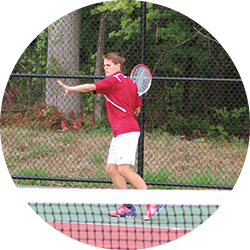
“Tennis is a very technical game, and even a slight tweak in positioning can really change the outcome,” Beluch says. “If we had a tough match, we needed to figure out a strategy to do better next time.”
Men’s tennis coach John Ciarleglio remembers Beluch as an excellent leader. “Mike was always the first in line when it came to recruiting efforts, hosting and contacting recruits, going to watch them play. Mike was very hard to replace, not just as a player but also as a captain.”
Again, as with tutoring, Beluch got back more than he gave. He remembers arriving to preseason training his first semester.
“I had this immediate family starting out,” he says of the team. “Coach Ciarleglio went beyond what a coach needed to do. It wasn’t just about tennis; he asked about classes and life, offered advice with problems. He was like a father to everyone on the team.”
The “quiet kid” was quiet no more. In fact, Beluch’s tennis career at Regis speaks volumes. He was named the New England Collegiate Conference (NECC) Player and Rookie of the Year and garnered First-Team honors. He led the team to a 13–7 record that included an appearance in the NECC Championship game. He recorded a 14–6 record at the No. 1 singles position, including a 9–1 record in conference play. He was also named First-Team Doubles by the conference.
Tennis stats aside, Beluch took academics just as seriously. An honors student and Regis Honors Program senior officer, he majored in biology with a pre-dental track. He was also a member of the biology honor society (Beta, Beta, Beta) and the Delta Epsilon Sigma Society.
All of Beluch’s Regis professors, he says, cared about “who you were and where you were going in life.” Philosophy professor Bernard Jackson, PhD, for example, the tennis team’s academic adviser, “pumped up the team with out-of-the-box thinking.” Chemistry professor Leslie Bishop, PhD, “pushed me in a very positive way and made sure I knew my stuff.”
Beluch entered Tufts University Dental School in summer 2017. With a long-term goal to open his own dental practice, he says he will not lose sight of building another “community of helping” through his dental work.
“I want to change as many people’s lives as possible,” Beluch says. “In addition to my regular practice, I will find ways to incorporate free or discounted dental care to people in need. Regis gave me the confidence to set very high expectations.”
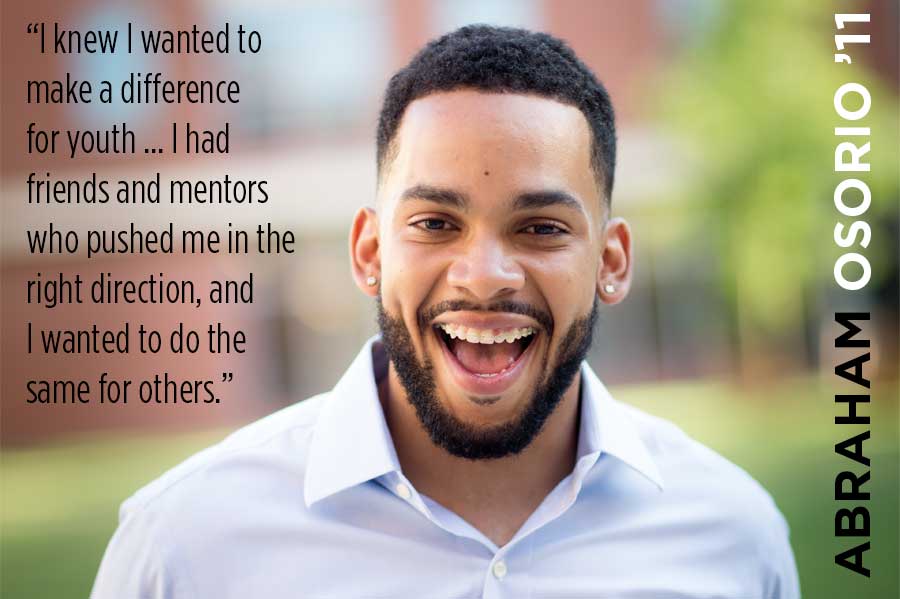
Abraham Osorio '11
"I knew I wanted to make a difference for youth ... I had friends and mentors who pushed me in the right direction, and I wanted to do the same for others."
B
eing among the men in the first full undergraduate coed class at Regis? Abraham Osorio ’11 considers it a bragging right. “Anytime I hear someone say that Regis is coed, I can say that I was one of the first men there. I worked hard and prevailed because I wanted to be a part of the Regis success story.”
Though Osorio faced some obstacles growing up, he found positive role models, such as his seventh grade math teacher Ms. Morgan.
“My mentors and friends served as a compass to help me develop the determination to do better,” Osorio says. “I didn’t know what better looked like, but I knew it was out there.”
Better came in the form of educational opportunities at Regis, and Osorio would become the first in his family to graduate from college.
Regis immediately became Osorio’s home away from home. He formed a special bond with his fellow male classmates; they supported each other as they navigated what was a new environment for Regis—and
for them.
At Regis, Osorio continued to find ways to develop the “moral compass” that would guide him toward a successful future. He recalls advice he got from a professor early on. First: If anyone gives you an ultimatum—either their way or the highway—take the highway; stay true to yourself. Second: Reach for the stars because no one is going to do it for you.
It was an introductory psychology course that inspired Osorio to dig deeper into the power of social influences on choices. “We didn’t become who we are by chance; we are molded by peer pressure and circumstances. But that does not have to define who you are.”
When it came time for a career, Osorio again turned to his compass for direction. After a short time in the banking industry, he decided to forge a new path—one that holds special meaning to him.
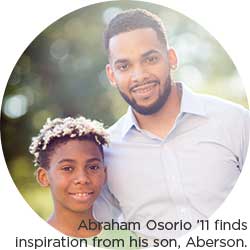
“I knew I wanted to be a leader and make a difference for youth,” he says. “In high school and college, I had friends and mentors who pushed me in the right direction, and I wanted to do the same for others.”
He pursued a master’s degree in secondary education and is now a social studies teacher at New Mission High School in the Boston community of Hyde Park. He teaches social and life skills to eleventh and twelfth graders and explores topics such as human nature and racism. But Osorio is not focused on the books as much as the platform: getting in front of youth to serve as a guide and mentor to help students develop their own moral compass and a better future.
“We all have dreams about what we want to do, but there are always things that could pull you off track,” Osorio tells his students. “Ignore those negative influences and forces in order to stay on track with goals and to find your own purpose in life.”
With that in mind, Osorio helped launch a mentor academic initiative at the school to support male students with behavioral, social, or academic disadvantages. Specifically targeted to underserved male students of color, Project OCHENDO follows initiatives such as academic support, academic mentorship, a social psychology course, financial literacy content (Osorio refers back to his Regis business courses for teaching material), progress monitoring, and extracurricular activities.
The goal, according to Osorio, is “to provide beneficial experiences that are normally beyond a student’s level of influence, and to provide support for the mandated, rigorous, 10-page senior defense essay needed to graduate.” Project OCHENDO hires professional male mentors of color to serve as effective role models. They help set a positive tone, promote academic and social development, and encourage professional success.
“Presenting real-life success stories of mentors helps students recognize that they, too, can rise above the hindering circumstances of their social and environmental challenges,” Osorio says. “It instills a certain level of hope in these youth, but it also provides them the opportunity to become one of these success stories.”
Osorio recalls how the Regis community helped him forge a new path. And he hopes that Regis students will also lean on their community, but more importantly, rely on themselves and reach for the stars.
“Use all of your resources, stay honed in on academics, stay focused, and never give up,” says Osorio. “People at Regis saw my potential and provided me with guidance and resources. It was my job to prove myself by being successful.”
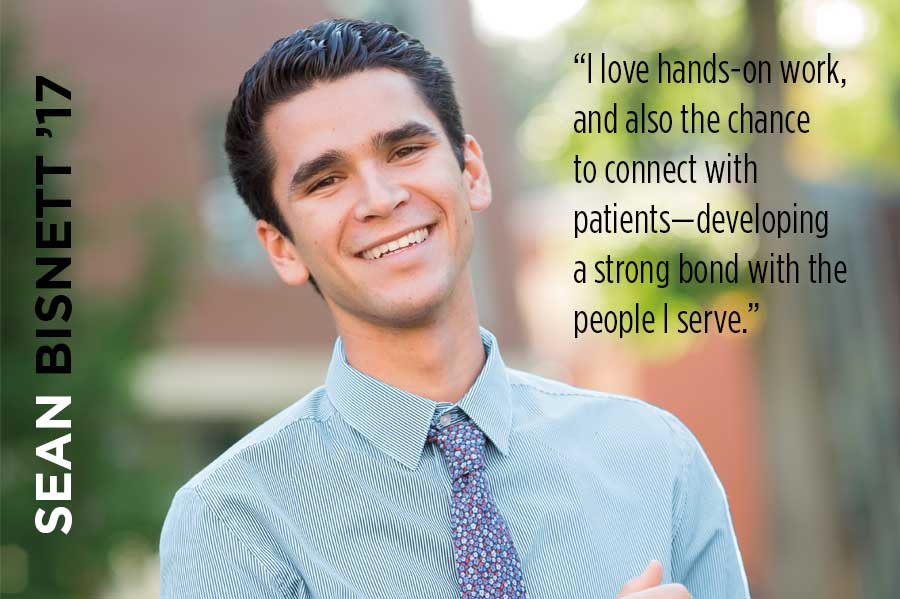
Sean Bisnett '17
"I love hands-on work, and also the chance to connect with patients—developing a strong bond with the people I serve."
S
ean Bisnett ’17 arrived at Regis six years after the university went coed at the undergraduate level—and he admits that it’s not something he really noticed. What he did notice was the athletics program (he was recruited for the men’s volleyball team) and the nuclear medicine major (which he explored thanks to his Regis advisers and professors).
“My professors explained that the curriculum included administering radioactive pharmaceuticals to patients during clinical in Boston-area hospitals,” Bisnett recalls. “I love hands-on work, and also the chance to connect with patients—developing a strong bond with the people I serve.”
Bisnett says that many faculty members became mentors, forming “very tight” relationships that included everything from attending industry conferences to preparing for board exams. Sometimes that included hard lessons. Bisnett recalls one time when he was feeling overwhelmed with multiple deadlines and he went to a professor in hopes of shifting some due dates. But instead of simply “fixing” the problem for him, she encouraged him to work harder.
“At first I didn’t enjoy hearing that, but once I took her advice, I realized that I had the capacity to put in more effort and ultimately succeed,” Bisnett says. “She helped me learn how to unlock my potential. She saw in me what I didn’t yet see in myself.”
Bisnett also worked hard outside of the classroom on the volleyball court. But arriving at Regis from California, he admits, was an adjustment. Though he had an impressive high school volleyball career (a two-time MVP) and was recruited for the Regis team, the style of coaching and play was different from back home.
“I was used to coaches who were very laid back; they let you do what you wanted as long as you figured things out, and I was more focused on fun than winning,” Bisnett explains. “At Regis, I worked very hard during practice, and I was surrounded by guys who wanted to train hard, play hard, and win. It was different, but ultimately good, because it pushed me to compete at a higher level.”
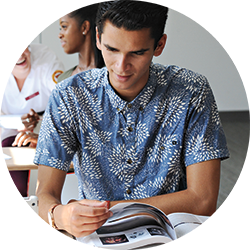
The proof is in Bisnett’s accomplishments. Freshman year he was the 2014 New England Collegiate Conference (NECC) Rookie of the Year, was a five-time NECC Rookie of the Week selection, and was named to the NECC All-Tournament Team. He was also NECC Defensive Player of the Year (junior year) and NECC Player of the Year (senior year). Sweeping these kinds of major awards gave Bisnett confidence; he recognized that hard work pays off. But it was when he was sidelined with a back injury that he stepped away and re-evaluated his priorities.
“Freshman and sophomore years I was super-focused on volleyball—the NECC, building the Regis program,” Bisnett says. “But when I fractured one of my lumbar vertebrae during my sophomore season, it made me realize that playing volleyball wasn’t something that would carry me through the rest of my life.”
The leadership roles he took on in volleyball and in other campus activities, however, would. Bisnett was volleyball captain for three years; he was a member of the Student Government Association (SGA) Advisory Athletics Committee; he was a student representative for the Regis Board of Trustees. And he started to realize, he says, the impact of his work: “People cared.”
As part of the SGA Advisory Athletics Committee, for example, Bisnett led the cause to build up athletic rallies to be more inclusive and appealing to non-athletes—adding new games and a fun deejay, and boosting advertising for events. (It was a group effort, he points out.) And attendance grew.
“It was great to see that when I put in more effort, I helped make something good happen,” Bisnett says. “My work and leadership affected the entire campus in a positive way.”
And, of course, Bisnett does not downplay the importance of the technical skills he gained at Regis. His clinical during junior year was at Beth Israel Deaconess Medical Center in Boston. Senior year was at Tufts Medical Center. He considers both “extended job interviews.” “As a student dealing with radioactive material, I built a lot of confidence in myself and trust from staff.”
Today, Bisnett holds a full-time job at Beth Israel Deaconess, something he considers a direct result of clinical placement because he already knew their systems, and the staff already knew him. When he reflects on Regis, he admits that he misses regularly spending time with his teammates and floormates. (“I knew it would have to end sometime,” he jokes of being on campus.) And while Bisnett enjoys reminiscing about his athletic accolades, he says: “Passing the boards and finding a job was the most resounding accomplishment I’ve had so far.”
Read more articles
Read the entire magazine online
Read the entire magazine in PDF format